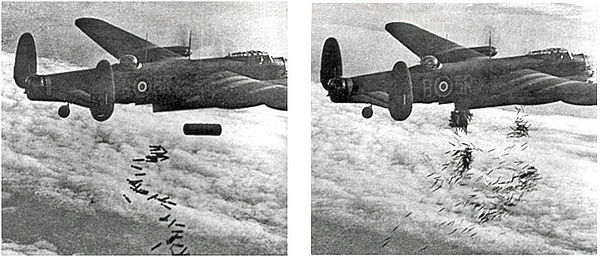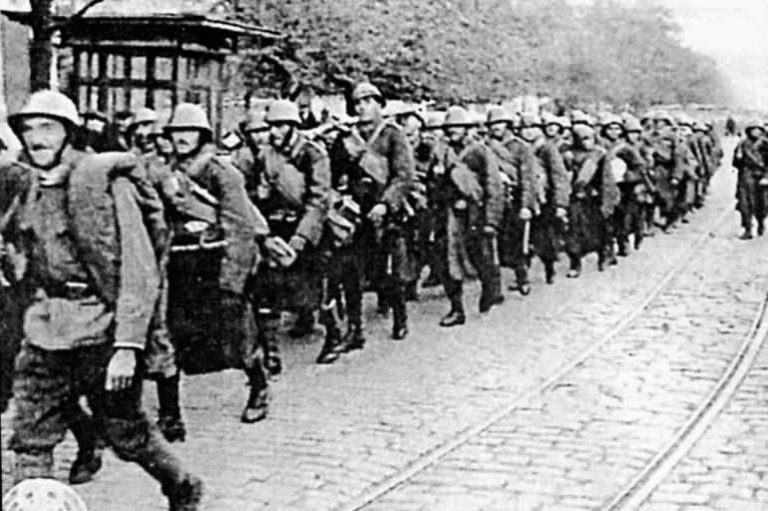
British strategic aviation until 1945 part 1
Wellington first production version - Mk IA. These bombers were deprived of airborne firing positions, which was ruthlessly used by German fighter pilots during dogfights in late 1939.
The creation of British strategic aviation was guided by the ambitious ideas of independently resolving the conflict and breaking the stalemate of trench warfare. The First World War did not allow these bold ideas to be tested, so in the interwar years and the next world conflict, the visionaries and "barons" of strategic aviation constantly tried to prove that they were the leading weapon with revolutionary capabilities. The article presents the history of these ambitious undertakings.
During World War I, air operations became a new form of warfare. A little more than ten years passed from the first successful flight of the Wright brothers to the start of the war, and three years from the moment of the first bombardment by the Italian Air Force during the Italo-Turkish war in 1911. It was obvious that aviation, with such great versatility and versatility, should have been of interest to theorists and visionaries, who almost from the very beginning made extremely bold plans - and the army itself, which expected somewhat less from aircraft and aeronautical pioneers. But let's start from the very beginning.
World War I: sources and origins of the doctrine
The first bombardment by the RAF, namely the Royal Naval Air Service, took place on October 8, 1914, when vehicles taking off from Antwerp successfully bombed the German airship hangars in Düsseldorf with Hales' 20-pound bombs. It can be assumed that these were the first strategic air operations, since they were aimed not at the troops on the battlefield, but at the means of transferring the war to the very heart of the enemy's territory. There were no strictly bombers at that time - the nature of the aircraft was determined by the method of application, and not by the equipment; bombs were dropped manually and "by eye", as there were no bombsights. Nevertheless, already at this initial stage in the development of military aviation, the civilian population got a taste for air strikes, and although German airships and aircraft, which sporadically appeared over England from January 1915, did not cause great material damage, the moral effect was great and incommensurable with the damage. However, such reactions are hardly surprising. A fall from the air, capable of surprising a man even in his own seemingly safe bed, was a completely new phenomenon in a society brought up in the spirit of gentlemen's war; the effect was aggravated by the complete randomness of such events - anyone, even the king, could become a victim of a raid, as well as by the initial ineffectiveness of defensive measures. In the late spring of 1917, German bomber squadrons began to appear in the daytime even over London itself, and the efforts of the defenders were initially in vain - for example, on June 13, 1917, repelling an air raid of 21 Gotha bombers, 14 of which headed for the capital, took off 92 aircraft that failed 1. The public was seriously concerned and the British authorities had to respond. The defense forces were reorganized and strengthened, which forced the Germans to go on night air raids, and it was tasked to create their own air force of a similar nature to strike at the German industrial base; The will to revenge also played a significant role here.
All this must have captured the imagination; The British saw for themselves that this new means of warfare had great potential - even small expeditions of bombers or solo flights of airships led to the announcement of an air raid, a stoppage of work in factories, serious anxiety of the population, and sometimes material losses. Added to this was the desire to break the stalemate in the Trench Warfare, which was new and shocking; they were strengthened by the helplessness of the commanders of the ground armies, who for almost three years could not change the nature of this struggle. The Air Force, as it were, offered a revolutionary alternative in this situation - defeating the enemy not by eliminating his "manpower", but by using an industrial base that produces and supplies him with means of combat. An analysis of this concept revealed another inevitable factor associated with strategic air operations - the issue of air terror and its effect on the morale of the civilian population, who worked with full dedication and with increasing labor in their homeland to allow soldiers to continue fighting in front lines. Although officially both sides of the conflict constantly stated that the targets of their air operations over the enemy country were exclusively military targets, in practice everyone knew about the impact of bombing on public morale.
